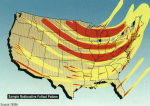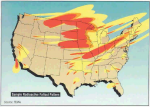History Learner
Well-known member
So, 1983 had a LOT of close calls with Nuclear Armageddon just barely being avoided according to many. However, let's say the balloon did go up, so to speak, and the nukes were lobbed back and forth in the Fall of that year. Once the dust settles, what comes after? Most research suggests Nuclear Winter, beyond a cooling effect in the immediate term, is a myth so we don't have to worry about that; same with Fallout rendering the world uninhabitable ala On The Beach or other like minded fiction. Given the combined ICBM total of NATO, Warsaw Pact and China as being ~5,000 or less, the Southern Hemisphere for the most part will get off okay with much reduced nuclear weapons exchange sans areas like the Middle East. Overall though, most of the immediate damage would be confined to the Northern Hemisphere.
It seems obvious Australia, Brazil, South Africa and Mexico would emerge as big players. The biggest question for me is the fate of India; neither the Soviets nor the Americans have any reason to target them, while Pakistani has no nuclear weapons at this point. That leaves the question of whether or not China will take the opportunity to use some of its arsenal to strike a few areas within it, given their limited size, or reserve their stockpile solely for the USSR, Vietnam and Taiwan. Given the multiple insurgencies at the time, the lose of command and control via the destruction of New Delhi (and perhaps a few other cities) would probably be enough to collapse them in a serious civil war.
Presuming the above, the Post-War order can thus have some guesses made. I'd imagine the remnants of the U.S. Government would very quickly set up shop in Mexico City and coordinate with the Mexican government on recovery of what's left of the United States, recalling surviving forces, handling American refugees in Mexico, etc. I'd imagine said U.S. remnants would eventually fold into a new confederation with Mexico, which would result in a hybrid nation in North America which could come to take the place of the U.S. handily if given a decade or two to properly formalize everything. Brazil becoming a superpower is obvious, perhaps leading a Pan-South America bloc only challenged by the aforementioned "Mexico" in the Americas. Australia would obviously also be powerful, but not to the same degree as the former two.
The real winner here, although not the most powerful, would be South Africa. It's likely SADF would institute a military government to control the situation, which was well within their capabilities to do and is aided by the Apartheid-era autarky policies that would minimize the economic damage of the nuclear war. The removal of Soviet and Chinese support to Black African states means SADF can only achieve decisive results in its border conflicts, instituting UNITA control in Angola and RENAMO in Mozambique, probably also toppling Mugabe in Zimbabwe. With millions of European and American refugees, it's likely South African can achieve a White plurality or even majority here, while also exploiting the Bantu-Zulu ethnic conflict to divide and rule.
Given enough time, I'd imagine you would see some successor nations emerge in the Northern Hemisphere from the ashes of the old, although I imagine a far amount of colonialism on the part of the Global South into the North would likewise occur.
It seems obvious Australia, Brazil, South Africa and Mexico would emerge as big players. The biggest question for me is the fate of India; neither the Soviets nor the Americans have any reason to target them, while Pakistani has no nuclear weapons at this point. That leaves the question of whether or not China will take the opportunity to use some of its arsenal to strike a few areas within it, given their limited size, or reserve their stockpile solely for the USSR, Vietnam and Taiwan. Given the multiple insurgencies at the time, the lose of command and control via the destruction of New Delhi (and perhaps a few other cities) would probably be enough to collapse them in a serious civil war.
Presuming the above, the Post-War order can thus have some guesses made. I'd imagine the remnants of the U.S. Government would very quickly set up shop in Mexico City and coordinate with the Mexican government on recovery of what's left of the United States, recalling surviving forces, handling American refugees in Mexico, etc. I'd imagine said U.S. remnants would eventually fold into a new confederation with Mexico, which would result in a hybrid nation in North America which could come to take the place of the U.S. handily if given a decade or two to properly formalize everything. Brazil becoming a superpower is obvious, perhaps leading a Pan-South America bloc only challenged by the aforementioned "Mexico" in the Americas. Australia would obviously also be powerful, but not to the same degree as the former two.
The real winner here, although not the most powerful, would be South Africa. It's likely SADF would institute a military government to control the situation, which was well within their capabilities to do and is aided by the Apartheid-era autarky policies that would minimize the economic damage of the nuclear war. The removal of Soviet and Chinese support to Black African states means SADF can only achieve decisive results in its border conflicts, instituting UNITA control in Angola and RENAMO in Mozambique, probably also toppling Mugabe in Zimbabwe. With millions of European and American refugees, it's likely South African can achieve a White plurality or even majority here, while also exploiting the Bantu-Zulu ethnic conflict to divide and rule.
Given enough time, I'd imagine you would see some successor nations emerge in the Northern Hemisphere from the ashes of the old, although I imagine a far amount of colonialism on the part of the Global South into the North would likewise occur.





